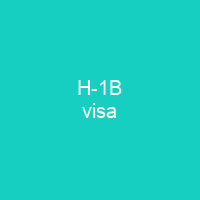The H-1B Visa: A Gateway to the American Dream?
Imagine a world where skilled workers from around the globe can contribute their talents and expertise to drive innovation and growth in the United States. That’s precisely what the H-1B visa aims to achieve, but is it living up to its promise? Let’s delve into the intricacies of this complex immigration program.
What Exactly Is an H-1B Visa?
The H-1B visa allows United States employers to employ foreign workers in specialty occupations with specialized knowledge and a bachelor’s degree or equivalent. The duration of stay is three years, extendable to six years, after which the visa holder can reapply. This program has its roots in the H-1 visa of the Immigration and Nationality Act of 1952, with caps set at 65,000 each fiscal year.
Defining a Specialty Occupation
A specialty occupation requires theoretical and practical application of highly specialized knowledge in fields such as biotechnology, chemistry, computing, architecture, engineering, statistics, physical sciences, journalism, medicine, economics, education, research, law, accounting, business specialties, technical writing, theology, and the arts. The regulations define a specialty occupation as requiring theoretical and practical application of highly specialized knowledge in a field of human endeavor.
The Numbers Game
Since 1991, the number of issued H-1B visas has quadrupled, with a total of 206,002 initial and continuing H-1B visas issued in 2022. The annual cap is set at 65,000, but due to exemptions and rollovers, the number often exceeds this limit. USCIS starts accepting applications on April 1st for visas that count against the fiscal year starting in October.
The Lottery System
Due to the high demand, the H-1B visa is awarded through a lottery system. In FY 2024, 758,994 registrations were submitted and 110,791 people were selected for an H-1B visa. Selected registrants can begin filing their Labor Conditions Application on April 1st with a six-month window before October 1st. Participants with a U.S. master’s degree or higher have two chances to be selected in the lottery: one for 65,000 visas and another for 20,000 extra spots.
Employer Responsibilities
The U.S. Department of Labor is responsible for ensuring that foreign workers do not displace or adversely affect wages or working conditions. A Labor Condition Application (LCA) must be filed electronically using Form ETA 9035E, which ensures the wage offered meets or exceeds the ‘prevailing wage’ in the area of employment and contains an attestation section to prevent importation of foreign workers to break strikes or replace U.S. citizen workers.
Taxation and Benefits
Employers must withhold Social Security and Medicare taxes from wages paid to employees in H-1B status. Eligibility for retirement benefits may depend on having worked and paid Social Security taxes, but bilateral agreements exist with certain countries for credits taken into account in foreign social insurance systems.
Family and Travel Considerations
H-1B visa holders can bring immediate family members (spouse and children under 21) to the United States under the H-4 visa category as dependents. An H-4 visa holder can remain in the US as long as the H-1B visa holder retains legal status. An H-4 visa holder can attend school, apply for a driver’s license, and open a bank account.
Challenges and Controversies
The H-1B visa program has faced numerous challenges and controversies over the years. Critics argue that it is a government labor subsidy for corporations, claiming it crowds out domestic workers and leads to lower wages for US computer science workers. Studies have shown mixed results regarding its impact on innovation, wages, and overall benefits to the US economy.
Future of H-1B
The future of the H-1B visa program remains uncertain as policymakers continue to debate its merits. Recent trends show a shift towards stricter regulations and increased scrutiny of employers’ compliance with labor laws. As technology continues to evolve, so too will the demands on skilled workers, making the H-1B visa an ever-evolving part of America’s immigration landscape.
The H-1B visa program is a double-edged sword. On one hand, it allows foreign talent to contribute significantly to American innovation and growth. On the other, it raises questions about labor displacement, wage depression, and the overall impact on domestic workers. As we move forward, it will be crucial for policymakers to strike a balance that benefits both employers and employees.

You want to know more about H-1B visa?
This page is based on the article H-1B visa published in Wikipedia (retrieved on December 28, 2024) and was automatically summarized using artificial intelligence.






